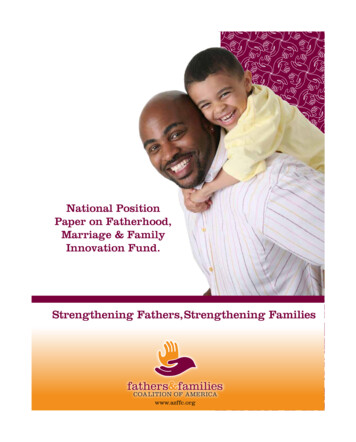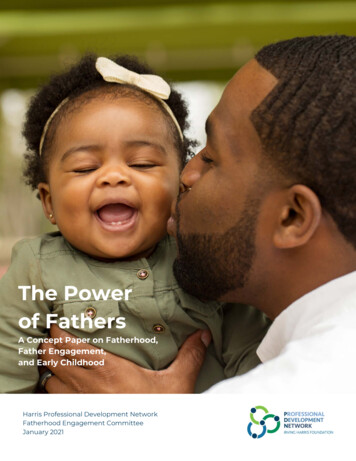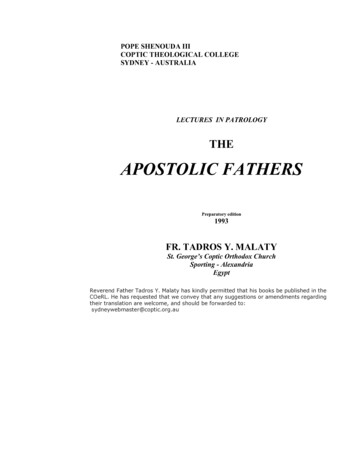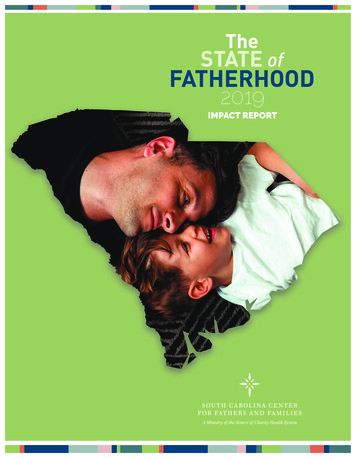
Transcription
1.pdf15/10/101.pdfCCMMYYCMCMMYMYCYCYCMYCMYKK19:10 AM5/9/1011:54 AMNational PositionPaper on Fatherhood,Marriage & FamilyInnovation Fund.Strengthening Fathers, Strengthening Familiesfathers&familiesCOA LITION OF AMERICAwww.azffc.org
AbstractDuring the last two decades of the 20th century and continuing into the 21st centurythere has been increased social and public policy development on responsible fatherhood.These policies address how the emerging field of practitioners should effectively addressresponsible fatherhood. Furthermore, the policies affect how men see themselves as fathers,and encourage father involvement in the lives of children. President William JeffersonClinton initiated policies on responsible fatherhood when he worked on national reform ofpublic assistance in 1995. The passage of the Personal Responsibility and WorkOpportunity Reconciliation Act (PRWORA) in September 1996, led to the increased interestin the effects of father’s contributions on child and family well being within welfarecaseloads. A number of demonstration projects and legislation efforts were designed toaddress the then 28,000,000 children without fathers in their home to make those fathersbecome accountable for economical support through Child Support Enforcement Agenciesnationwide. In the meantime, limited research analyzed the effects of fathers on children’swell being. Research efforts expanded not just within the United States but alsointernationally. Documented studies demonstrate the effects of the modern father’sabsence and involvement with their families leading to an introduction of internationalefforts to address advanced research, policy and program development. Discourse offatherhood gave rise to clear policy prescriptions and in 2006, President George W. Bushimplemented with U.S. DHHS the provision of 150 million dollars, annually, in grantfunding for healthy marriage and responsible fatherhood initiatives. In 2010, proposedTemporary Assistance for Needy Families (TANF) Fatherhood, Marriage, and FamilyInnovative Fund by President Barack Obama proposes 500 million in funding and analteration of program services for fathers and relationship skill building. Fathers &Families Coalition of America (FFCA) based on over fifteen (15) years of expertise concurswith this initiative as necessary for effective Fatherhood, Marriage, Family programs.However, based on FFCA’s collective expertise, this proposal limits itself to only eightlocations and will not have a national impact of services on fatherless households,employability of low-income fathers, child outcomes and building and strengthening healthyrelationships and marriages. FFCA provides recommendations for the development andimplementation of a new blueprint of services, evaluation, and policy based on ourexperience and expertise in providing services to fathers and families in partnershipsbetween community and faith-based organizations and state governments.1 39 East Jackson Street‐Phoenix, AZ 85004 (602)‐254‐5081 www.azffc.org
2.pdf15/10/102.pdf19:00 AM5/10/108:58 AMRecommended Considerations for the Fatherhood,Marriage and Family Innovation FundCCMMYYCMCMMYMYCYCYCMYCMYKKThe Fatherhood, Marriage, Family Innovation Proposal resonates with Fathers &Families Coalition of America’s mission of strengthening and bonding families in underserved communities that are splintered by rejection, abandonment and other disruptions ofrelationships. The Fatherhood Initiative presents the balancing act of the MarriageInitiative. So as not to polarize these most important relationship-bonding entities, wemust make intentional the ultimate vision of healthy parenting relationships for allchildren, with an emphasis on inclusion vs. exclusion. Based on over a decade of expertisein family development we find that it is critical that all services should have a relationshipskill building component. Therefore, one of the challenges we welcome explicitly orimplicitly posed by a mixed-methods approach for funding, professional development,technical assistance, and accountability. Interviews of professionals combined withexperiences from FFCA and other professionals at all levels there are concerns on thecontinued advancement of Fatherhood, Marriage and Family Innovative FundingPrograms. We believe the FMFI funding must go through the U.S. Department of Health &Human Service – Administration for Children & Families in a new program office. Thatoffice should be called “The Office of Fatherhood - Family Strengthening Assistance,”reporting directly to the Assistant Secretary as a concerted demonstration from the WhiteHouse on the importance of fatherhood, healthy relationships, strengthening families andcommunities.RECOMMENDATION 1: TANF supported programs should be limited to low incomeindividuals and families. The services provided for fatherhood and relationship educationshould be limited to those on or eligible for TANF or for those whose incomes do not exceed200% of the Federal poverty level.RECOMMENDATION 2: FFCA strongly urges that the proposed Fatherhood, Marriage,and Family Innovation (FMFI) funding should not go to state agencies. This funding forfamilies should be available to community, non-profit and faith-based entities in opencompetitive grants.RECOMMENDATION 3: The proposed funding of only eight states would severely limitthe impact of the Fatherhood, Marriage and Family Innovation Fund. A concern of only “8”states funded; state consortiums and or a lack of discretionary funding to community based2 39 East Jackson Street-Phoenix, AZ 85004 (602)-254-5081 www.azffc.org
3.pdf15/10/108:59 AMorganizations would limit full impact of services. Funding should be open to allnon-profit agencies.RECOMMENTATION 4: We believe the FMFI funding must be administered by the U.S.Department of Health & Human Service – Administration for Children & Families in anew program office, “The Office of Fatherhood - Family Strengthening Assistance,”reporting directly to the Assistant Secretary.RECOMMENDATION 5: We propose a National Capacity Building Assistance program.Many organizations lack the infrastructure, cohesive focus, strategy, and skills toeffectively deliver fatherhood and relationship building services. All funded grantees shouldhave an assigned Capacity Building Assistance Provider who has extensive expertiseworking with fathers and relationship skill building.CMYCMRECOMMENDATION 6: Training & Technical Assistance should not be limited to a soleprovider but can be built on the Head Start Quality Improvement Centers (QIC) model.Developing a Multi-Ethnic Fatherhood Marriage Family QIC national training & technicalassistance provider operated by proven experts in the fatherhood and marriage professionwill improve the overall accountability and quality of services. Service providers thatgenerate revenue through the sales of their fatherhood, marriage, family products are noteligible as a training and technical assistance provider to avoid conflicts of interest.MYCYCMYKRECOMMENDATION 7: Mandated collaborative opportunities for all states, CBOs orfaith-based organizations that receive funding under the final Fatherhood, Marriage andFamily Innovative funding. Funded organizations should have formal agreements beyonddomestic violence consortiums. The additional formal working collaborative must include atthe collaborative agreements with workforce providers, substance abuse providers, andmulti-ethnic providers reflective of the community.RECOMMENDATION 8: FFCA encourages Fatherhood Program Specialist for all states,regions and or county child support, child welfare, and JOBS divisions as a liaison to thecommunity providers and customers. FFCA conducted an analysis to learn the ways thatthe federal government has attempted to bridge the goals of child support, child welfare,and even the JOBS program with the demands of those who implement programs incommunities.3 39 East Jackson Street-Phoenix, AZ 85004 (602)-254-5081 www.azffc.org
Our StoryIn 1996, Arizona Fathers & Families Coalition started as a grassroots consortium in response towelfare reform proposals and the professional development of staff throughout Arizona. Themotivation to create and incorporate Arizona Fathers & Families Coalition, Inc. had its genesisafter our group was awarded a statewide Temporary Assistance for Needy Families (TANF) YoungFathers grant, a Basic Education/Life Skills TANF grant, Federal Job Reverse Access Commutegrant, three county TANF grants, Statewide TANF Career Preparation grant, and a TANFCharacter Education grant for K-12 youth. The services developed by Fathers & Families Coalitionwere provided to diverse populations throughout Arizona.In 1996, Arizona was one of eight states to utilize Temporary Assistance for Needy Familiesresources to establish Young Father’s programs for low-income fathers. However, manypractitioners and policymakers were reluctant to change their view of fathers’ parenting role. Manyof the practitioners did not have skills to work specifically with fathers. There was a lack oforganizations offering family-centered services that were inclusive of fathers, which inspired ourgrassroots group to host our Inaugural Fatherhood Conference in February 2000. Over the pastdecade our organization has provided direct services to both mothers and fathers who receive TANFresources. In addition; provided and training, technical assistance, capacity building assistance andprogram support to well over 8,000 individuals on fatherhood best practices.Our impact to advance both organizational responsiveness and practitioner abilities to workwith fathers and families is felt across the nation not only through our annual conference, but alsothrough presentations, technical assistance, training and our summer institutes providedthroughout the United States. This assistance includes international assistance to fatherhoodpractitioners as far away as Ghana, Micro Indonesia, Japan, Guam, Virgin Islands, Puerto Rico, andthe United Kingdom. We solicit support and involvement from the faith-based communities tofurther strengthen our capacity to serve local, statewide, tribal nations and federal governmentagencies that serve fragile families.A study of our vision and purpose led to our name change from Arizona Fathers & FamiliesCoalition to Fathers & Families Coalition of America (FFCA) to more aptly reflect our contributions,service providers, and trainers. These actions also led to the creation of affiliates with a membershipcomponent to FFCA. In 2007, a business plan developed from a Chicago based firm outlined a goalof five (5) Fathers & Families Coalition Affiliates by the end of 2009 and ten (10) by the end of 2010.However, FFCA’s national relationships allowed us to exceed our established goal with currentaffiliates in the following communities: Arizona Statewide, South-Eastern Arkansas, Los Angeles,San Diego, San Francisco, Lancaster, CA (emerging in San Bernardino, Bakersfield, andSacramento), Denver, Houston, Chicago, Detroit, Delaware Valley, Tampa Bay/St. Petersburg,Raleigh, Utica, Bronx, Utah Statewide with pending FFCA in Albany, West Virginia, Ohio,Milwaukee, Long Island, New Paltz, NY and Trenton. Moreover, FFCA has more than 100organizational memberships who utilize our training and technical assistance services. These4 39 East Jackson Street‐Phoenix, AZ 85004 (602)‐254‐5081 www.azffc.org
member organizations as an example, include colleagues from an array of professional fields suchas, Healthy Marriage Responsible Fatherhood funded programs; Head Start; Early Head Start;Healthy Families; Institutes of Higher Education; Juvenile Justice; Tribal TANF programs, andmany other diverse fields.OUR MISSIONFFCA has a mission to enhance the capacity of service providers throughout the nation, sothey will be better equipped to effectively serve fathers, mothers and children.OUR VISIONWe do this by providing professional development training. Our goal is to improve theoutcomes for children, through healthy fathers and family interaction. We differentiate ourselvesthrough our distinctive capacity to connect to diverse organizations and populations nationwide.This is also done through unique networking forums during our national conference and otherprofessional development venues. These events are intended to empower providers throughbuilding existing services, policies and collaborations, with a focus on fathers, mothers and children.While we understand the needs of divorced fathers and never married fathers, we do not providethose direct services. Strategically our proven methodology to work with organizations andpractitioners has transformed thousands of colleagues and organizational leaders to embrace theimportance of fatherhood nationally and internationally. Through our collaboration efforts we havedeveloped Fathers & Families Coalition Affiliates who are extensions of FFCA assisting providersand families. FFCA has served as an official Fatherhood Professional Development Trainer for theNational Head Start Association. More recently, FFCA is a technical assistance/trainer for ICF andis engaged in expanding best and promising practices for fatherhood practitioners and familyservice agencies.Our Diverse National ReachAs previously mentioned, FFCA is unique from many other national fatherhood and/ ormarriage entities in our local, state and regional support through our FFCA Affiliates and our activeBoard of Directors who effectively provides direct training and technical assistance to individualsand organizations in an approach that compliments staff and consultants. Furthermore, FFCA hasone of the more diverse professional, multi-ethnic and racial, topography and expertise ofFatherhood, Marriage and Family professional development practitioners. The senior leadership ofour National Board of Directors and Affiliate Directors provides a mutual effort to achieve theoverall goal of enhancing the abilities of practitioners and organizations to effectively provideservices to fathers, mothers, children and community development. Our FFCA Affiliates are uniquein that they also serve on the Advisory Council of the Board of Directors.5 39 East Jackson Street‐Phoenix, AZ 85004 (602)‐254‐5081 www.azffc.org
ChallengesThere are several challenges for today’s fathers, including the high birthrate amongunmarried partners that continues to rise across America. Poor health outcomes, lack of knowledgeabout sexually transmitted diseases, and under-education also continue to be problematic amonghigh-risk groups within our society. Insufficient fatherhood programs, inadequate culturallyrelevant interventions, and insufficient policies, economic opportunities, and poor parenting skillsare additional challenges to both fathers, children, families and the service providers designated tohelp.The need to educate practitioners and service providers on cultural distinctions, outreach,language differences, and the importance of eliminating myths, stereotypes, and biases towardsfathers of color can help to reduce fatherlessness as well as improve child outcomes. Researchsubstantiates that when fathers engage with their children during the first two years of theirchildren’s life, that 80% of the fathers will stay involved. Furthermore, social predictors suggest thatwith higher levels of father involvement children benefit with higher levels of child wellbeing andimproved co-parenting relationships. When a father has a healthy relationship with his children,his children are usually physically, emotionally, and mentally healthier.BarriersPrograms serving families and society continue to experience barriers for father involvement.Many of these barriers are reflected in racial stereotypes, myths, language, economics, policy,unemployment, and under-educational achievements, negative and hostile relationships betweenbiological parents, child support, forensic issues, transportation, unstable housing, and evenpaternity. The unmet needs of fathers, lack of access to services and resources, fear and distrust ofservice providers must be addressed in order to remedy the problems that confront many fathers.Many fathers want and need services. However, our society historically has negated the needs offathers in favor of the mother and child, leaving the father underserved without social andemotional support and disengaged. When this happens there are poor outcomes for all familymembers.Fathers do make a difference in the lives of their children. Fathers are important to thephysical, emotional, and social development of their children. Father presence adds to the quality oflife and positive child outcomes. Fathers & Families Coalition of America is striving to help improveprovider services and policies so that fathers can stay involved in the lives of their children. We arecommitted to mothers, children and fathers and will continue to work towards strengtheningfamilies to reduce the negative outcomes of fatherlessness.6 39 East Jackson Street‐Phoenix, AZ 85004 (602)‐254‐5081 www.azffc.org
Programs should provide opportunities to join develop supportive networks within thecommunity, access to diverse experts for quality improvement and training and technical assistancefrom federal, state and recognized capacity building assistance organization such as servicesprovided by Fathers & Families Coalition of America. Barriers that limit father involvement arepresented at various levels from public policies, organizational responsiveness, and staffambivalence, gate keeping by maternal family members, and mothers and fathers themselves. Inorder for family-centered practices, policies, and program development to improve services forchildren and families, the role of fatherhood needs additional examination. The responsiveness ofeffective fatherhood services to fathers increases opportunities for father involvement in the lives oftheir children.Recommended Fatherhood/Relationship ProgramRequirementsOver the past few decades, many family service organizations have implementedfatherhood program designs and frequently embedded within the overall organizationalmission. In many instances these programs are newly and or developed by agencies neworganizations to serve fathers. There are limited tools as comprehensive as the PractitionerEffective Fatherhood Services Survey (PEFSS) to help organizations identify domains toimprove services. Fathers & Families Coalition of America recommends all federal and nonfederal funded Fatherhood, Marriage, and Family Innovative programs are required toconduct a formal assessment on their organization’s capacity in working with fathers. Theprocess to ensure a promising fatherhood practice involves on-site interviews, production ofa self-study, and thorough documentation of program Organization Performance Measures.FFCA designed the PEFFS tool over the past decade as a foundation that should beused in conjunction with the Capacity Framework that FFCA provides through technicalassistance, assessment, program evaluation (both through review of documentation andinterviews of staff, parents, and community partnerships), which explains the sevenelements of organizational capacity and their components. The PEFSS asks the reader toscore the organization on each element of organizational capacity, by selecting the text thatbest describe the organization's current status or performance. The framework and thedescriptions in the PEFSS were developed based on our Fathers & Families Coalition’scollective experience designing and evaluating services for fathers, adaptation of fatherfriendly resources, as well as the input of many nonprofit experts and practitioners.FFCA’s expertise recognizes a national need for organizations developing a process forimprovement through both self- assessment and accreditation using the baseline7 39 East Jackson Street‐Phoenix, AZ 85004 (602)‐254‐5081 www.azffc.org
assessment, such as, the Practitioners’ Effective Fatherhood Services Survey is a valuabletool for determining how an agency's policies, procedures and practices compare torecommended practices identified by nationally recognized experts in the field offatherhood, relationship skills building and family development. Fathers & FamiliesCoalition of America developed this tool designed help nonprofit organizations assess theirorganizational capacity in the provision of services to fathers. This tool and or a tooldeveloped specifically to analyze organization performance measurements working withfathers, marriage/relationship skills building and families. The benefits of OrganizationAssessment & Program Evaluation:(1)(2)(3)(4)(5)(6)(7)(8)Improves Effectiveness;Identifies Operation and Management Needs;Promotes Team Work and Staff Development;Identifies Replication and Wasted Effort;Promotes Public Awareness;Increases Outcomes for Children, Fathers, and Mothers;Promotes Community Development; andPrepares For Agency Accreditation.FFCA has developed a model of accreditation based on experience providing multiethnic capacity building assistance to fatherhood and relationship skill buildingorganizations. The purpose of the accreditation program is to provide a means of formallyverifying and recognizing public works agencies for compliance with the recommendedpractices. It is a voluntary, self-motivated approach to objectively evaluate, verify andrecognize compliance with the recommended management practices. The objectives of theaccreditation program are: to create impetus for organization self improvement andstimulate general rising of Organization Performance Measures developed by FFCA basedon best practice capacity building strategies. The FFCA Accreditation is offered voluntaryevaluation and education program rather than government regulated activity recognizegood performance and provide motivation to maintain and improve performance improvefatherhood, relationship skill building and family development service performances.Programs need to know how to gather and use information to improve programfunctioning and undertake meaningful efforts to measure and document their success.Fatherhood programs should have in place an ongoing process of self- assessment andoutcome measurement that includes descriptive data, outcome data, and evaluativemeasures. This process of self-monitoring should have a plan to solicit and evaluate8 39 East Jackson Street‐Phoenix, AZ 85004 (602)‐254‐5081 www.azffc.org
participant feedback. A program evaluator with both organizational developmentexperience and working with fathers should be engaged.FFCA collaborative partnerships with workforce development experts such asOpportunities Industrialization Centers (OIC) who’s over forty-years of assisting fathersobtain meaningful skills is an example of community building partnerships. OIC hasprovided training to over 3 million (primarily low-income) individuals and has successfullyplaced over 2.5 million individuals into sustained employment. FFCA believes that similarskills are necessary for direct service providers, which should be embedded in promisingpractice fatherhood programs and their organizations. Fatherhood programs should offerextensive support and a variety of opportunities for fathers to develop the skills knowledge,and competencies required in the workforce. Programs should provide opportunities forfathers to connect successfully with employers and employment resources within theircommunity. Inclusion of pre-work maturity soft skills assists fathers make the connectionbetween learning and working with many low-income fathers challenged by limited adulteducation; skills that expand occupational exploration into the workforce; and skillsdevelopment opportunities. Fathers & Families Coalition of America suggests the followingprogram model that involves the providing relationship skills to fathers and mothers asgermane for effective outcomes for children and enhancing sustained employability forfathers (below).9 39 East Jackson Street‐Phoenix, AZ 85004 (602)‐254‐5081 www.azffc.org
10 3 9 E a s t J a c k s o n S t r e e t - P h o e n i x , A Z 8 5 0 0 4 ( 6 0 2 ) - 2 5 4 - 5 0 8 1 w w w . a z f f c . o r g
PICTORIAL OVERVIEW OF FFCA CAPACITY BUILDING PROJECTGOAL: To Improve Fatherhood, Marriage and Family services Fathers & FamiliesCoalition of America has designed a process that strengthens CBOs, Non-profitsand Coalitions through our Capacity Building Initiatives to help underservedpopulation groups overcome unemployment and employability factors that impacttheir financial sustainability and quality of life.Level ofParticipantsLeadAgencyFFCALeadAgencyGrassroots entities &IndividualsOrganizations/Networks/FFCA MembersCapacityBuildingActivitiesTraining Curriculumin 5 tTechnicalAssistance& TrainingFathers & FamiliesCoalition elopmentCultureEvaluationEvaluation 3 9 Ethousandsast Jackson Street‐Phoenix, AZ 85004 (602)‐254‐5081 www.azffc.orgFFCA,11surveyedof practitioners existing needs to improve services to fathers and families. Consistently, providers requestsupport with program assessment, technical assistance and training, community engagement, leadership development and evaluation.The training curriculum for these capacity building activities includes five modules: 1) Organizational Development; 2) ProgramDevelopment; 3) Community Engagement; 4) Leadership Development; and 5) Evaluation.
The joining of the Fatherhood and Marriage/Relationships Initiatives can offer aninvigorating “head-start” to fathers in building strong relationships with their children andparents building healthy relationships for the benefit of their children—whether or not itresults in marriage.Fathers & Families Coalition of AmericaLeadershipJames Rodríguez, MSW, Ph.D. Candidate- CEO/PresidentEXECUTIVE MEMBERSJudge Veronica Torrez –Chairperson - Houston, TXDr. Ramon Nieves Vice-Chairperson - Chicago, ILLatrisha Centers-Broom MA. – Secretary – Phoenix, AZMEMBERS OF THE BOARDJeffery M. Leving, LTD –Chicago, ILHonorable Cloves Campbell, Jr. - ArizonaState Representative Phoenix, AZPatricia Wilson-Pheanious, MSW, JDDenver, CORichard Claytor-Boston, MAKevin Poleyumptewa-Ahwatukee, AZIran Rodríguez – Long Island, NYTed Dance-Scottsdale, AZKenneth Braswell-Albany, NYNellie Reina -Salt River PimaMaricopa Indian Community, AZEd Gonzalez-Santin, MSW-Tempe, AZRev. Stephen Browning –Mesa, AZSantino Bernasconi-Guadalupe, AZVictor Berrelez -Phoenix, AZNeil Tift -Mesa, AZColleen Wilburn, La Plata, MDRev. Terry Weston, Plano, IL12 3 9 E a s t J a c k s o n S t r e e t ‐ P h o e n i x , A Z 8 5 0 0 4 ( 6 0 2 ) ‐ 3 0 1 ‐ 2 9 4 7
EMERITUS STATUS MEMBERSDr. Sherry Ulmer – Coolidge, AZDr. Gene C. Blue- Treasurer –Phoenix, AZDomingo Rodríguez-Phoenix, AZFFCA AFFILIATE DIRECTORSMr. Kevin PoleyumptewaPhoenix, AZMrs. Dana RossDelaware Valley RegionMs. Toyce NewtonPhoenix Youth and Family ServicesCrossett, ARMr. Chuck TomaselliUp State RotaryUtica, NYMs. Charlene Lewis-MeeksCalifornia Institute of Health & SocialServices, Inc.Los Angeles, CAMs. Cynthia HarrisCJH Education, IncRaleigh, NCMr. Raymond CapperBay Area Male Involvement NetworkSan Francisco, CAMr. Rueben LawrenceAtlanta, GAMr. John HughesMetro United Methodist Urban Ministry(Metro)San Diego, CADr. Ramon NievesTuesday’s ChildChicago, ILMrs. Robin Wright –KingDetroit, MIMr. Frank BedollaSalt Lake City, UTDr. Nathan O’NealCity of Denver Human ServicesDenver, COMr. Larry SavalaHispanic Family InitiativeHouston, TXMr. Miguel SantanaCommunity Empowerment NetworkBronx, NYMr. Gregory JohnsonPinellas County Urban LeagueSaint Petersburg – Tampa Bay, FLMr. Halbert SullivanFather’s Support CenterSt. Louis, MOMs. Barbara TinneyNew Haven Male Involvement NetworkNew Haven, CT13 3 9 E a s t J a c k s o n S t r e e t ‐ P h o e n i x , A Z 8 5 0 0 4 ( 6 0 2 ) ‐ 3 0 1 ‐ 2 9 4 7
14.pdf15/10/109:05 AMRev. Touré TylerCommunity Empowerment OrganizationBakersfield, CAMr. James RobinsonEconomic Opportunity CommissionFreeport, NYDr. Sharon RabbCenter for the Empowerment of FamiliesSan Bernardino, CADr. Michelle FosterKISRADunbar, WVDr. Carolyn CurtisSacramento Healthy Marriage CoalitionSacramento, CABishop Henry HearnsLiving Stone Cathedral of WorshipAntelope Valley, CACMYCMMYCYCMYK14 3 9 E a s t J a c k s o n S t r e e t - P h o e n i x , A Z 8 5 0 0 4 ( 6 0 2 ) - 3 0 1 - 2 9 4 7
1.pdf15/10/101.pdfCCMMYYCMCMMYMYCYCYCMYCMYKK19:10 AM5/9/1011:54 AMNational PositionPaper on Fatherhood,Marriage & FamilyInnovation Fund.Strengthening Fathers, Strengthening Familiesfathers&familiesCOA LITION OF AMERICAwww.azffc.org
in the effects of father's contributions on child and family well being within welfare caseloads. A number of demonstration projects and legislation efforts were designed to address the then 28,000,000 children without fathers in their home to make those fathers become accountable for economical support through Child Support Enforcement Agencies










